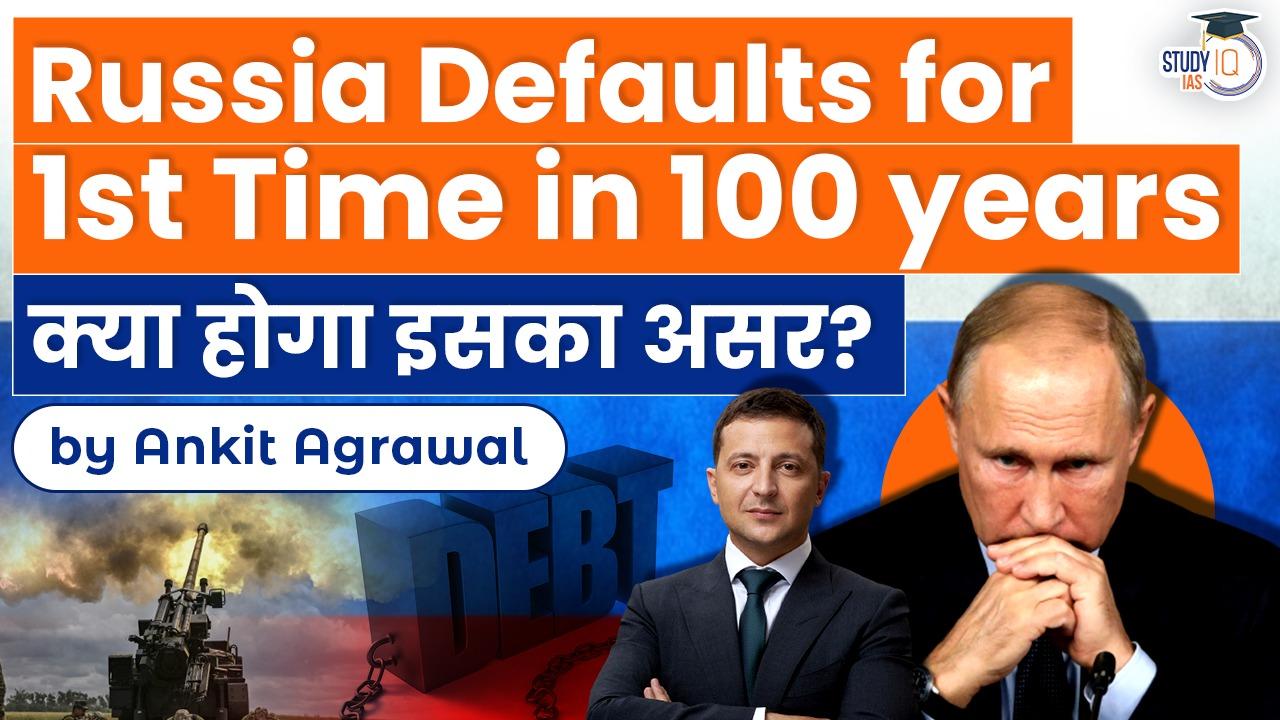Table of Contents
What has happened?
- Russia is poised to default on its foreign debt for the first time since the Bolshevik Revolution more than a century ago,
- Further alienating the country from the global financial system following sanctions imposed over its war in Ukraine.
- A 30-day grace period on interest payments originally due May 27 expired Sunday. But it could take time to confirm a default.
- “It’s not a default of our country, but an artificial, man-made collapse of the international financial system,”
- Konstantin Kosachev, a deputy speaker of the upper house of Russian Parliament, said Monday.
- The U.S. and Europe Union have deliberately created “artificial obstacles for Russia to service its sovereign debt in order to put the tag of default on it,” Russian Finance Minister Anton Siluanov said last week.
How much does Russia owe?
- About $40 billion in foreign bonds, about half of that to foreigners.
- Before the start of the war, Russia had around $640 billion in foreign currency and gold reserves, much of which was held overseas and is now frozen.
- Russia has not defaulted on its international debts since the Bolshevik Revolution, when the Russian Empire collapsed and the Soviet Union was created.

- Russia defaulted on its domestic debts in the late 1990s but was able to recover from that default with the help of international aid.
- Investors have expected Russia to default for months.
- Insurance contracts that cover Russian debt have priced a 80% likelihood of default for weeks, and rating agencies like Standard & Poor’s and Moody’s have placed the country’s debt deep into junk territory.
So what investors do?
- Bondholders who have credit default swaps contracts that act like insurance policies against default can ask a committee of financial firm representatives to decide,
- Whether a failure to pay debt should trigger a payout, which still isn’t a formal declaration of default.
- The Credit Default Determination Committee an industry group of banks and investment funds ruled June 7 that Russia had failed to pay required additional interest after making a payment on a bond after the April 4 due date.
- But the committee put off taking further action due to uncertainty over how sanctions might affect any settlement.
- The formal way to declare default is if 25% or more of bondholders say they didn’t get their money.
- Once that happens, provisions say all Russia’s other foreign bonds are also in default, and bondholders could then seek a court judgment to enforce payment.
- In normal circumstances, investors and the defaulting government typically negotiate a settlement in which bondholders are given new bonds that are worth less but that at least give them ome partial compensation.
- But sanctions bar dealings with Russia’s finance ministry.
- And no one knows when the war will end or how much defaulted bonds could wind up being worth.
What happens when country defaults?
- Once a country defaults, it can be cut off from bond-market borrowing until the default is sorted out and investors regain confidence in the government’s ability and willingness to pay.
- But Russia has already been cut off from Western capital markets, so any return to borrowing is a long way off anyway.
- The Kremlin can still borrow rubles at home, where it mostly relies on Russian banks to buy its bonds.
Impact of Russia’s default
- Western sanctions over the war have sent foreign companies fleeing from Russia and interrupted the country’s trade and financial ties with the rest of the world.
- Default would be one more symptom of that isolation and disruption.
- Investment analysts are cautiously reckoning that a Russia default would not have the kind of impact on global financial markets and institutions that came from an earlier default in 1998.
- Back then, Russia’s default on domestic ruble bonds led the U.S. government to step in and get banks to bail out Long-Term Capital Management, a large U.S. hedge fund whose collapse, it was feared, could have shaken the wider financial & banking system.
- Holders of the bonds for instance, funds that invest in emerging market bonds could take serious losses.
- Russia, however, played only a small role in emerging market bond indexes, limiting the losses to fund investors.
- While the war itself is having devastating consequences in terms of human suffering and higher food and energy prices worldwide,
- Default on government bonds would be “definitely not systemically relevant,” International Monetary Fund Managing Director Kristalina Georgieva has said.
Q) Which among the following is the examples of derivative securities?
- Return backed security
- Cash flow backed security
- Mortgage backed security
- Interest backed security
Latest Burning Issues | Free PDF























 WhatsApp
WhatsApp